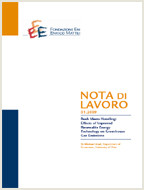The Global Emission Game: On the Impact of Strategic Interactions Between Countries on the Existence and the Properties of Nash Equilibria

02.12.2013
Mélanie Heugues
C72, H41, Q54
Non-Cooperative Game Theory, Climate Change, Global Emission Game, Nash Equilibria, Strategic Substitutes and Complements
Climate Change and Sustainable Development
Carlo Carraro
In a context of laissez-faire, the propositions established in this paper shed light on the evolution of the problem of greenhouse gas (GHG) accumulation in the atmosphere for each type of strategic behaviour resulting from countries’ interconnection on global markets. In a framework of strong economic interdependencies, they show the potential consequences of the free trade arrangements on the environment and question the idea that free trade liberalisation should necessarily lead to an increase in countries’ welfare. This paper provides an exhaustive typology of countries’ strategic behaviours and a strong static comparative analysis with regard to the exogenous parameters of the model. Whereas some assumptions tend to be less relevant from an environmental point of view; others that are very relevant have not yet been considered in the literature. Using lattice theoretic notions, this paper generalizes the existing results of the literature and determines new equilibria not yet exploited. It thus extends the current framework of the traditional public economic theory dealing with public goods.
***
Suggested citation: Heugues, M., (2013), ‘The Global Emission Game: On the Impact of Strategic Interactions Between Countries on the Existence and the Properties of Nash Equilibria’ Nota di Lavoro 108.2013, Milan, Italy: Fondazione Eni Enrico Mattei.
